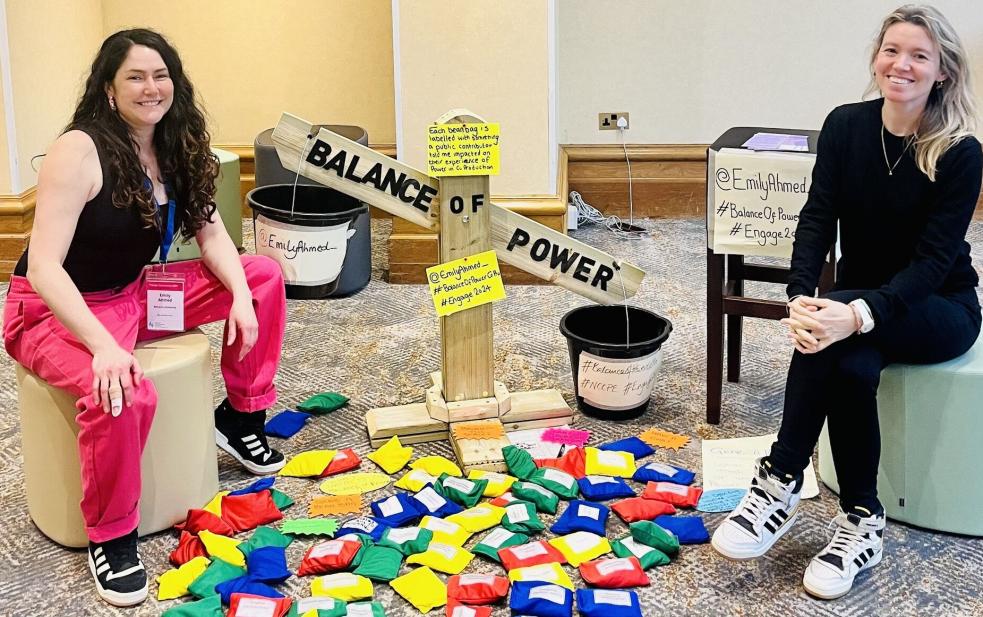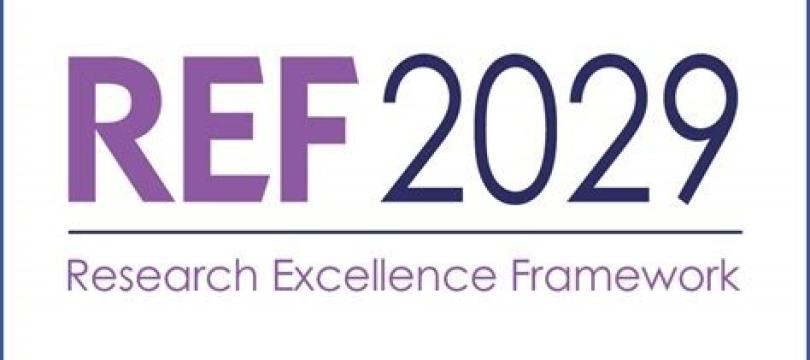The Balance of Power in Co-Production: Reflections from Engage 2024
At Engage Live 2024, Emily Ahmed, a final-year PhD student in Health Sciences at the University of Warwick, and Vita Moltedo, a public contributor and member of Emily's Advisory Group, hosted a stand at the Engage Poster Party - an interactive showcase of innovative public engagement projects. Here, Emily blogs about the experience and shares some insights she gained from Engage delegates.

Power can be a tricky concept to engage with, but its a defining aspect of co-production and forms the focus of my PhD which explores public contributors’ experiences of power and power-sharing (or lack of) in the co-production of UK health research. I recently had the opportunity to present some of the emerging themes from my research at the NCCPE Engage Conference 2024 in Bristol. We had a great time playing with power and about a hundred bean bags! Want to find out more? Read on….
I’ve worked in community engagement for over 25 years. Starting out as a youth worker, then working with children and families. Over the last 12 years, I’ve specialised in facilitating and leading co-production and patient and public engagement in health and social care services and research. I am passionate about challenging inequity, rocking boats, and supporting organisations and professionals to be more reflective in the ways we work. I’m also a visual artist… so that, combined with the old youth worker spirit means I love an opportunity to get creative, play and work in visual and tactile ways. So presenting at Engage 2024 was a great chance to experiment with fun and interactive methods for engagement and dissemination.
Poster Party
Keen to create a space for exploring power dynamics in co-production through a hands-on activity, Vita and I brought along a giant 1.6-meter wooden weighing scale and 100 beanbags labeled with the words and statements that public contributors had said impacted on their experiences of power. Delegates were encouraged to play and chat while taking part in a tactile exploration of power and power-sharing.
We invited people to choose beanbags with words that resonated with them, reflect on what the words meant to them, then place the beanbag onto the scales and see if we could re-balance the scales of power. The open-space format and interactive approach ensured everyone could participate how they wanted. Some observed from a distance, while others delved into deeper discussions. Inclusivity was crucial to us, and the session was purposefully designed with input from people with lived experience of disability and neurodiversity. This ensured that physical space, communication preferences, and energy levels were respected, and helped us create a welcoming environment. Some people watched and listened, while others immersed themselves.
It was important to us that the team facilitating the activity had lived experience of being public contributors, so we could bring our reflections and invite public contributor delegates we met on the day to label their own beanbags. This helped us ensure that the experiences of public contributors were central to the conversations.
What impacts on experiences of power in co-production
We were keen to find out which beanbag/theme our participants had chosen and why. Here's what they told us:
Emotional Labour: "I chose emotional labour because I think it can be very difficult for people to constantly share their stories. And particularly when it comes to health, which is very personal. They're asked to do quite a lot outside of something they may already struggle with. So, it's important to acknowledge that and understand that they are giving a lot of themselves to the research project."
Trust: "I picked up one relating to trust. Because I think it's really important that when you're involved in these kind of co-production projects that people on both sides kind of trust each other and are respectful of each other's views and understand why they are in the project."
Collective Decision Making: "I chose decision making. Collective decision making. This obviously can get really tricky, like, building consensus, getting to governance, who's got what power, which role? Basically, who's making the decision? Who has the power to make a decision."
Hierarchy: "I think one that stood out was the hierarchy one, I guess because I think there's a lot of awareness of what roles people have versus what roles you have, kind of, in a space or around the table. And I think something like that, that's quite playful, kind of levels, levels the hierarchy out sometimes."
Intersectionality and Being Unheard: "I chose a few. There was quite a big crowd so I couldn't see all of them. I liked 'intersectionality' being there. I liked 'being unheard'. That was a good one."
What 'power' means to our participants
We also asked what they thought about the concept of power in relation to co-production. The term power can have a mix of positive and negative connotations and can be quite triggering for people. They told us…
Negative Connotations: "Probably negative, because I think of power imbalance. And I think of, I mean, I am at the intersection of quite a few. I'm a female, Muslim, South Asian, astrophysicist. So there was a lot of power imbalance in my life that I had to deal with. It's like negative connotation for me."
Struggle and Equity: "I think I always see it as a bit of a struggle almost. Like a bit of a tug of war where people push on both sides and it always tips over to one side rather than the other. So the idea of equity, I think, while it's something that we all always try to achieve, it's always quite hard to get."
Equal Power in Relationships: "I feel like there's still a long way to go for power to be shared equally. I think it's really important that people have kind of equal power in relationships and projects. I think you have to be really upfront from the start by what everyone is looking to get out of this project and then kind of work collaboratively to decide how you're going to do something. Make sure everyone has a voice."
Power as a Prerequisite for Change: "Well I've had to get comfortable, I use it a lot for work I had problems with it, but for the longest time now I've gotten over that. And I kind of see it as what's the word, like it's a prerequisite, it's just a fundamental, like it's just, if you want to change the world then you need power. It's just what it is, and I think we have to get comfortable with it, especially as communities and groups of people who are underrepresented and maybe feel like we lack power. We have to get comfortable with the work in order to build power."
Initial Negative Thoughts: "When I think of it actually, I have quite negative associations with it. Um, I see it as something that's kind of inequitable and unfairly distributed. But then you can frame it around kind of empowering."
Find out more or get involved
Check out the links below for how to stay up to date on or get involved in Emily's research,
Feedback
During the session, Vita filmed short interviews with some of the session participants, who told us they really appreciated the interactive way we presented our research:
"It's tangible. You can see the imbalance of power. But it also starts a conversation about what that means in practice."
"I think it's really cool, it's a very interactive way. People are going to come over and see the beanbags, right? So it's a good way to get everybody talking, I think. And the fact that the scales don't seem to ever really balance is kind of poetic."
"I thought it was a really good way of having a fun and tactile way of discussing lots of the different barriers that people face when they're taking part in patient involvement and co-production."
"It's a very clever, very clever way to kind of make it a bit of a metaphor and do something hands-on. So that you can think about it in a more tangible way."
Acknowledgments
I extend my heartfelt thanks to the NCCPE team for their support and for the innovation grant without which we wouldn’t have been able to take part. Special thanks to Vita Moltedo for co-facilitating the session and conducting interviews, and to Niccola Hutchinson-Pascal, Simon Watt and Katherine Hathaway for their assistance in setting up. I am also grateful to all the delegates who participated, bringing their energy and insights and to Alexandra Nita, Jess Shaw, Kareem Dayes, Mariam Rashid, and Sarah Barnes for sharing their feedback in the interviews.
